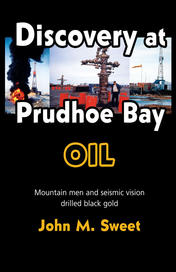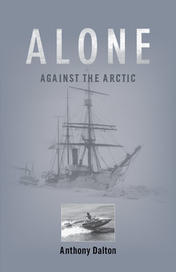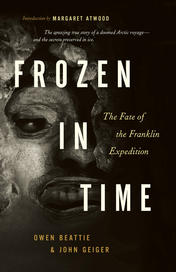Polar Regions



Excerpt: SECOND TRIP OUT: GETTING WET
John got up and went off to find the next portage, too ill to eat breakfast, but obsessed to get going. He was driving the Bug with Jimmy sitting beside him, and before he left he showed me on the map where we were, almost halfway between Yellowknife and Great Bear Lake, on Rae Lake, which extends for eighteen miles through an archipelago of tiny islands, with a half-mile of land that separates it from the next lake, Tuche (pronounced Ta-ka). Rae Lake is notorious for uneven ice depths due to narrow rocky passages and uncertain currents between the islands, and previously Denison's road had avoided this lake surface by taking an all-land route around that was extremely rough and hilly. This year he had decided to save three or four miles of rough portage and two or three days of road-making by cutting directly across the lake. The only land construction would be the half-mile connection between Rae and Tuche lakes. John had arranged for the men at the Hislop Indian village to check the depth of the lake ice and mark out a new portage, the half-mile connecting link between the two lakes. What he and Jimmy were looking for now was snowshoe tracks and other markings that the Indians had left in the bush leading from the old road to the new.
Their morning search was unsuccessful, and after lunch they set off again. This time they took me along. I sat in the back of the Bug on a plank on the floor, below the escape hatch in the ceiling that had once had a sliding door but was covered now by a flimsy rag of a coat. "I don't trust this old pile of junk but there's no point spending ten or twelve thousand dollars for a new one when I use it only this once a year," said Denison, who was feeling considerably better. We were breezing over the ice but there was an ominous clink in the engine. Denison was driving and Jimmy was holding his foot pressed down on the exposed gearshift, which was half-broken, to keep it from jumping off into neutral. We came to the north end of Rae Lake, traversing several potholes, and hit the old portage road with a terrible thud. The new route would utilize the old portage entrance but would turn off sharply towards Tuche Lake, cutting off several miles on land. We kept stopping so that Jimmy could look for snowshoe tracks, and he finally came back and said he had found them in the snow, and also a red marker. He said the new route was so short and so close by that he could actually hear the voices of our men, who had moved forward and were clearing the road in and out of the last Rae Lake pothole. Denison, always eager to scout ahead of the crew, decided to continue across Tuche Lake and beyond before turning back, but a few miles out on the ice, the Bug stopped. "Engine's buggered. The temperature and oil are both down," John said. "We must have burned a bearing." Both men got out and tinkered with the motor. I was convinced by now that they could fix any piece of machinery any place, so I was not surprised when the engine started chugging again right away, but we had to drive slowly so as not to put a strain on it. We turned round and retraced our steps to where Jimmy had found the markings. Through the thick undergrowth we could see the smoke of our trucks and hear the men talking, but between us and them was a deep wooded ravine, a rugged half-mile of terrain through which the new portage would have to be built. Denison stopped the Bug, and Jimmy cut across the ravine on foot to show the men where to break the new road.
The sun was going down and John was impatient. Why didn't Jimmy return? "Why don't we follow Jimmy in the Bug?" I asked.
"The way this old Bug is now, she'd never make it," Denison said. "We'd have to go right through the reeds - only way we can get to the other trucks is to go back the way we came, and this Bug's so broke down, I don't think it would make that now, either. My idea is to have Jimmy tell the men where we are, and have them come to us on the new trail, clearin' it." He looked at his watch, swore, got out of the Bug and disappeared through the snow into the ravine.
In the crippled Bombardier with its engine still running, for company I had Jimmy Watson's tool kit, an oil and a drum, an ice auger, a shovel, an axe, and two propane tanks, one of which Denison lit before he left. I was quite warm and since it was dark out, I curled up with a sleeping bag and slept. When I awoke, it was after five, so I stepped out the Bug, wondering if I should follow Denison. The snow was surprisingly deep, up to my waist; in the ravine, it would be up to my neck. How often I had read about novices in the North who froze to death a few yards from shelter! I was turning to get back in the Bug when I saw an electric lantern swinging towards me. Denison emerged from the darkness. He climbed into the driver's seat looking grim. "The Cat's in the water," he said heavily. "It's down four feet in the last pothole, thirty feet from shore, turned over on its right side. If we had a winch on a truck we could pull it out in a few minutes, but the winch on thirty-six has a burned-out bearing, and the only other winch that's strong enough is on the Cat itself. The radios are dead, so I'll have to go back to the garage for help. But the first thing I have to do is to get this Bug back to the other vehicles while it's still running. Keep your foot on the gearshift, and let's go!"
I am sitting where Jimmy sat, my foot pressed down on the gearshift, my hand pressed on my knee to keep my foot steady, my other arm bracing me on the seat. The Bug leaps forward with a horrid lurch. I look up into the stream of brightness made by our headlights and gasp. We are driving directly into a large white tree whose thick trunk is coming up to meet us out of the dark. Small brush crackling under our treads and the treetrunk closer and closer. I look at Denison; he is looking straight at the treetrunk but makes no effort to swerve. Swerve where? We are surrounded by trees. "Keep your foot on that gear!" he snaps, without turning his head. So I hold on to the gear and the seat, and the tree comes up to our windshield, separated from my face by the short curved front of the Bug and its little bumper. I am too petrified to make a sound. I can't make a sound. I expect the thick trunk to smash the windshield and wipe me away.
CRACK!
The tree snaps off like a twig! Unbelievable! It falls over, laden with snow, as neatly as if it has been cut with a scissors.
CRACK! CRACK! CRACK!
The trees fall before us as we crash through the woods. A demented force, The old Bug rattles and shakes, quivers with each blow.
CRACK! CRACK! CRACK!
I am getting so used to this madness that I don't even close my eyes any more when we hit. It takes a birch longer to break than a spruce. Am I dreaming? Is this a nightmare?
A yellow patch of light above the trees ahead in the black sky. We leap onto the ice, into a circle of headlights. We are crossing the pothole and the Cat, Denison's large red TD-14 International tractor is lying on its side, great wounded animal, its right track under water with broken ice floating around it. The canvas, so short a time ago such brave protection from Burns, is flapping nervously in the strong wind. The other vehicles are standing at a respectful distance, shedding light; comforting companions, noble mourners. Denison shouts, "Lift your foot!" and as I do, the gearshift slips into neutral and we come to a shivering stop, the motor idling. My toes are stiff and cold from the air that has been blowing on them through the hole at the base of the gear. How far did we come? Half a mile? Impossible. It must have been miles. It was a matter of minutes. It seemed like my lifetime.







